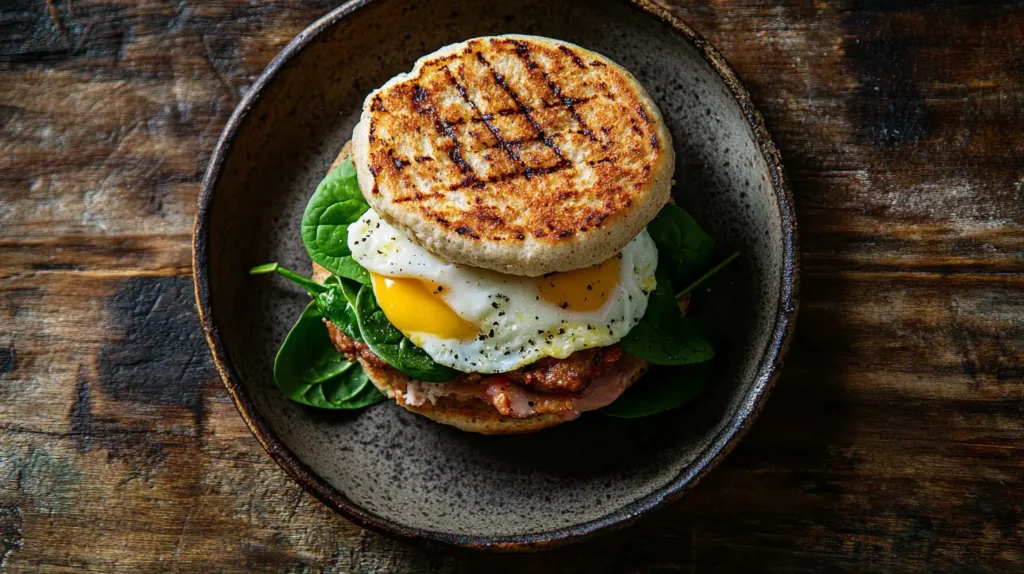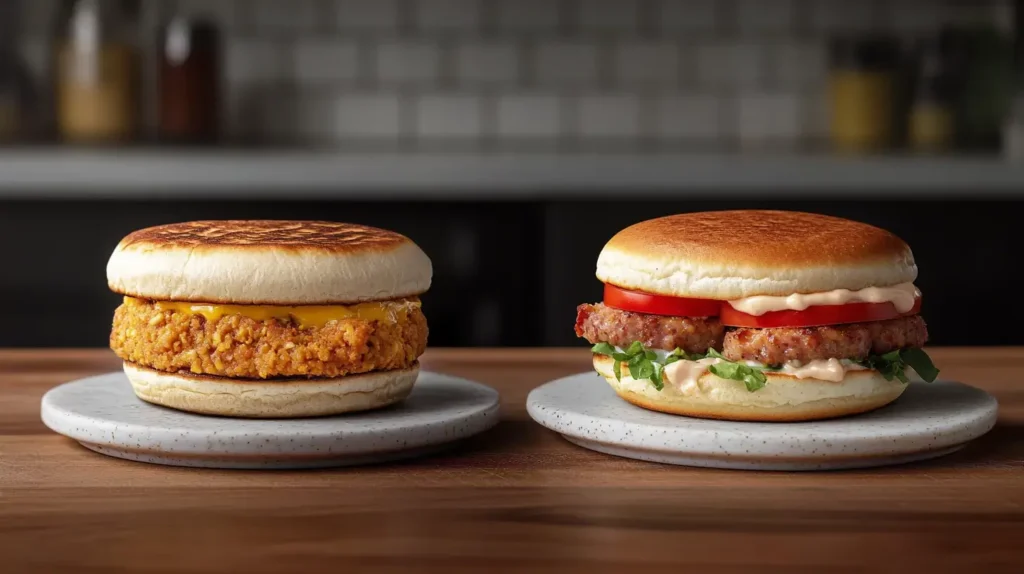Is a Sausage Egg and Cheese McMuffin Good for You?
Introduction

The Sausage Egg and Cheese McMuffin is a breakfast classic, loved for its combination of savory sausage, creamy cheese, fluffy egg, and a toasted English muffin. It’s convenient, delicious, and a staple on fast-food breakfast menus worldwide.
But when it comes to nutrition, is this popular sandwich a good choice? With its mix of protein, fats, and carbohydrates, the McMuffin can provide energy for the day ahead. However, like many fast-food options, it has its share of nutritional drawbacks.
In this guide, we’ll explore the health benefits and potential downsides of the Sausage Egg and Cheese McMuffin. You’ll also find tips on making healthier versions at home, so you can enjoy this iconic sandwich while staying on track with your health goals.
Table of Contents
Nutritional Breakdown of a Sausage Egg and Cheese McMuffin
Calories and Macronutrients in a Sausage Egg and Cheese McMuffin
A typical Sausage Egg and Cheese McMuffin contains approximately:
- Calories: 450–480 kcal
- Protein: ~20–25 grams
- Carbohydrates: ~30 grams
- Fat: ~30 grams
This makes it a calorie-dense option, providing a good balance of macronutrients but with higher fat content than some other breakfast choices.
Sodium and Cholesterol Levels in a Sausage Egg and Cheese McMuffin
One of the biggest concerns with a McMuffin is its sodium and cholesterol levels:
- Sodium: ~800–900 mg, which is about 40% of the recommended daily intake.
- Cholesterol: ~200–220 mg, largely from the egg and sausage patty.
High sodium and cholesterol can pose risks for heart health if consumed regularly.
Vitamins and Minerals in the Ingredients
Despite its drawbacks, the McMuffin contains some beneficial nutrients:
- Calcium: From the cheese, which supports bone health.
- Iron: Found in the sausage patty and English muffin, important for energy production.
- B Vitamins: Eggs and the English muffin provide essential B vitamins for metabolism and brain health.
Health Benefits of Eating a Sausage Egg and Cheese McMuffin
High Protein Content for Energy
The Sausage Egg and Cheese McMuffin contains approximately 20–25 grams of protein, making it a good choice for a protein-packed breakfast. Protein helps:
- Maintain Muscle Mass: Especially important for active individuals.
- Provide Sustained Energy: Slower digestion of protein ensures you stay full longer.
A Balanced Mix of Carbs, Fats, and Protein
One of the key advantages of the McMuffin is its macronutrient balance:
- Carbs: Provide a quick source of energy.
- Fats: Offer longer-lasting satiety.
- Protein: Builds and repairs muscles while keeping hunger at bay.
This combination makes it a practical breakfast option for busy mornings.
Portable and Convenient for Busy Mornings
The McMuffin is a grab-and-go option that doesn’t sacrifice taste. It’s an excellent choice for:
- Commuters: Easy to eat on the way to work.
- Time-Sensitive Schedules: No need to spend time preparing a full breakfast.
Its compact size and portability make it a reliable breakfast option for those short on time.
Potential Downsides of a Sausage Egg and Cheese McMuffin
High Sodium Levels and Health Risks
The Sausage Egg and Cheese McMuffin contains approximately 800–900 mg of sodium, which accounts for nearly 40% of the recommended daily intake for most adults.
- Impact on Blood Pressure: High sodium intake can contribute to hypertension.
- Increased Risk of Heart Disease: Consuming excessive sodium over time may lead to cardiovascular issues.
For individuals managing sodium levels, this sandwich should be eaten in moderation or replaced with a lower-sodium alternative.
Saturated Fat Content and Heart Health
With around 10–12 grams of saturated fat, the McMuffin exceeds the recommended daily limit for many health-conscious diets:
- Saturated Fat Sources: Most of the saturated fat comes from the sausage patty and cheese.
- Heart Health Risks: Regular consumption of high-saturated-fat foods can elevate cholesterol levels and increase the risk of heart disease.
Switching to leaner protein options like turkey sausage or plant-based patties can significantly reduce saturated fat intake.
Caloric Density and Weight Management
At 450–480 calories, the McMuffin is calorie-dense for its size.
- Portion Control Challenges: It may not be as filling as meals with lower calorie density, potentially leading to overeating later.
- Occasional Indulgence: For those watching their calorie intake, it’s better to save the McMuffin for an occasional treat rather than a daily staple.
How to Make a Healthier Sausage Egg and Cheese McMuffin

Substituting Ingredients for Better Nutrition
By swapping out certain ingredients, you can significantly improve the nutritional profile of your McMuffin:
- Use Lean Protein: Replace pork sausage with turkey sausage, chicken sausage, or plant-based patties for lower fat and calories.
- Choose Whole-Grain Muffins: Opt for whole-grain English muffins to add fiber and reduce refined carbs.
- Switch to Egg Whites: Use egg whites instead of whole eggs to lower cholesterol and calories while maintaining protein.
- Low-Fat Cheese: Select reduced-fat or plant-based cheese alternatives to cut down on saturated fat.
Preparing a Low-Calorie, High-Nutrition Version
Making your own McMuffin at home allows for greater control over calories and nutrients:
- Grill or Bake Sausage: Avoid frying to reduce added fat.
- Skip the Butter: Toast the muffin in a toaster or dry skillet instead of using butter.
- Add Fresh Veggies: Include spinach, tomato slices, or avocado for extra nutrients without significantly increasing calories.
Vegetarian Options for a Sausage Egg and Cheese McMuffin
Boost the health benefits of your McMuffin by incorporating vegetables:
- Spinach or Kale: Add a handful of leafy greens for added vitamins and minerals.
- Bell Peppers: Slice and sauté bell peppers for a touch of sweetness and crunch.
- Tomatoes: Fresh tomato slices add juiciness and vitamin C.
These simple additions make your sandwich more filling, nutritious, and satisfying
Comparison to Other Breakfast Options
How It Compares to Other Fast-Food Breakfast Sandwiches
The Sausage Egg and Cheese McMuffin holds its own against other fast-food breakfast choices:
- Bacon, Egg, and Cheese Croissant: Typically contains 500–600 calories due to the buttery croissant and additional fat content.
- Breakfast Burrito: Can range from 400–700 calories, depending on fillings like cheese, sausage, and potatoes.
- Double Sausage Biscuit: Often exceeds 600 calories with higher sodium and fat levels, making the McMuffin a lighter option.
The McMuffin’s protein-to-calorie ratio makes it a relatively balanced choice among fast-food breakfasts.
Is It Healthier Than Pancakes or Croissants?
- Pancakes with Syrup: A serving of three pancakes with butter and syrup can reach 600–800 calories, offering little protein or fiber.
- Croissants: The buttery texture of croissants increases calorie and fat content to 500–600 calories, often with less protein compared to the McMuffin.
The McMuffin provides more protein and sustained energy than these options, making it a better choice for those with active lifestyles.
The Benefits of Homemade Versions
A homemade Sausage Egg and Cheese McMuffin offers the advantage of customization for better nutrition:
- Lower Sodium: Using low-sodium sausage and cheese can significantly reduce sodium levels.
- Higher Fiber: Whole-grain English muffins add more fiber for digestive health.
- Healthier Fats: Incorporating avocado or skipping the cheese reduces unhealthy saturated fats.

For a step-by-step guide, check out our Sausage Egg and Cheese McMuffin Recipe to learn how to recreate this breakfast classic at home.
Frequently Asked Questions About Sausage Egg and Cheese McMuffins
ade, where you control the ingredients:
- Use turkey sausage or plant-based patties to lower fat and calories.
- Swap whole eggs for egg whites to reduce cholesterol.
- Opt for whole-grain English muffins for added fiber and nutrients.
How Often Can I Eat a McMuffin and Stay Healthy?
Is sausage and Egg McMuffin good for you?
The Sausage and Egg McMuffin can be a good breakfast option in moderation. It provides protein and essential nutrients like calcium and iron. However, it is relatively high in calories, saturated fat, and sodium, which may not align with all dietary goals. Pairing it with a healthier beverage like water or black coffee and balancing it with lighter meals throughout the day can help fit it into a balanced diet.
Can I eat a McMuffin if I’m trying to lose weight?
Yes, you can eat a McMuffin while trying to lose weight, as long as it fits within your daily calorie and nutritional goals. To make it work:
Opt for smaller portions or share your meal.
Consider removing the sausage to cut calories.
Pair it with a piece of fruit or unsweetened beverage for a more balanced meal.
Weight loss is about overall calorie management, so moderation is key!
Does McDonald’s use real eggs for sausage egg McMuffin?
Yes, McDonald’s uses real eggs for the Sausage Egg McMuffin. Each McMuffin is made with a freshly cracked Grade A egg that is cooked in a special egg ring to create the classic round shape. This adds to the authenticity of the flavor and texture.
Will eating a big breakfast help me lose weight?
Eating a big breakfast can potentially support weight loss if it helps control hunger throughout the day, leading to fewer calories consumed later. A high-protein breakfast like a McMuffin might help keep you full longer. However, the key to weight loss lies in overall calorie intake and energy expenditure. Ensure your big breakfast includes nutrient-dense, balanced foods for the best results
Conclusion
So, is a Sausage Egg and Cheese McMuffin good for you? The answer depends on how it fits into your overall diet. While the McMuffin offers a balanced mix of protein, carbs, and fats, its high sodium and saturated fat content make it a less-than-ideal option for everyday consumption, especially in its fast-food form.
However, with some simple swaps, a homemade version can be a healthier alternative. By using lean protein, whole-grain muffins, and fresh vegetables, you can enjoy all the flavors of this breakfast favorite without the nutritional drawbacks.
For a detailed guide on how to create your own McMuffin, check out our Sausage Egg and Cheese McMuffin Recipe. Customizing your sandwich ensures you can enjoy it guilt-free, whether you’re looking for a quick morning meal or an occasional treat.
With moderation and a focus on fresh ingredients, the Sausage Egg and Cheese McMuffin can be part of a healthy and satisfying breakfast routine.

